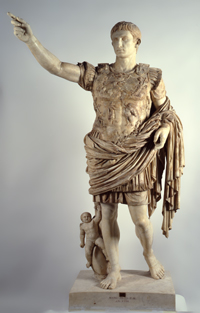Our Mission
 The mission of classics at Skidmore is to help shape the future of our students through
the study of the past. By using interdisciplinary methodologies, students examine
and explicate the languages, literatures, histories, religions, cultures, art, and
artifacts of the peoples of the ancient Mediterranean. Students apply multi- and cross-cultural
perspectives to gender, ethnic, and social issues in order to gain insight into the
cultures of the classical world. In reading Greek and Latin prose and poetry, both
in the original language and in translation, students contextualize works of literature
in their larger cultural and historical settings and recognize their significance
in the past and their relevance for the present and future. Students conduct research
in order to present oral and written arguments supported by primary sources, theoretical
constructs, and established scholarship. In acquiring these critical and analytical
skills, classics majors prepare themselves for life beyond college on both the personal
and professional level. Professional opportunities can include careers in education,
communication, arts, law and government, and library sciences.
The mission of classics at Skidmore is to help shape the future of our students through
the study of the past. By using interdisciplinary methodologies, students examine
and explicate the languages, literatures, histories, religions, cultures, art, and
artifacts of the peoples of the ancient Mediterranean. Students apply multi- and cross-cultural
perspectives to gender, ethnic, and social issues in order to gain insight into the
cultures of the classical world. In reading Greek and Latin prose and poetry, both
in the original language and in translation, students contextualize works of literature
in their larger cultural and historical settings and recognize their significance
in the past and their relevance for the present and future. Students conduct research
in order to present oral and written arguments supported by primary sources, theoretical
constructs, and established scholarship. In acquiring these critical and analytical
skills, classics majors prepare themselves for life beyond college on both the personal
and professional level. Professional opportunities can include careers in education,
communication, arts, law and government, and library sciences.
Student Learning Goals
Below are the departmental learning goals mapped to College-wide goals for student learning.
The overall learning goals of the Classics Department are to empower students exploring classical antiquity to:
- Read Greek and Latin prose and poetry within their larger cultural and historical settings. (Ia, Ib, Ic, IVc, IVd)
- Read critically and analyze closely literary texts and modern scholarship. (Ia, Ic, IIa, IIb, IIe, IVa, IVd)
- Identify and assess selected artifacts and monuments within their cultural contexts. (Ia, Ib, Ic, IVd)
- Read and analyze historical documents within their social contexts and evaluate the role of the individual in ancient cultures. (Ia, Ib, Ic, IIa, IIb, IVa, IVb, IVc, IVd)
- Present orally and in written form an argument supported by primary and secondary sources. (Ic, IIa, IIb, IIc, IId, IIe, IIIc, IVa, IVb, IVc, IVd)
- Develop multi- and cross-cultural perspectives and apply them to gender, ethnic, and social issues. (Ia, Ib, Ic, IId, IIe, IIIa, IIIb, IIId; IVa, IVb, IVc, IVd)
- Assess and present scholarship of a theoretical nature and apply theory to both primary and secondary sources. (Ia, Ic, IIa, IIb, IIc, IIe; IIIc, III.d, IVa, IVb, IVc, IVd)
Visual Literacy
- Isolate the appropriate visual materials for assignments and assessments, such as papers, in-class discussions, presentations, and exams. (Ia, Ic; IIa, IIb, IIe; IVc)
- Interpret visual materials in isolation and in their original context. (Ib; IIIb, IIId; IVb, IVc, IVd)
- Analyze visual materials for historical, art historical, and/or cultural significance. (Ic, IIa, IIb, IIe, IIIb, IIId, IVa, IVb, IVc, IVd)
- Deploy visual materials appropriately in assignments and assessments. (Ic, IIa, IIb, IIc, IIe, IIIc, IIId, IVa, IVb, IVc, IVd)
Information literacy
- Identify and isolate primary and secondary sources for assignments and assessments. (Ia, Ic, IIa, IIb, IIe, IVc)
- Acquire the research skills to assess those sources. (Ic, IIa, IIb, IIe, IIIc, IVb, IVc, IVd)
- Evaluate the merits of those sources in terms of content and reliability. (Ib, IIa, IIb, IIe, IIIa, IIIb, IIIc, IVb, IVc, IVd)
- Incorporate those sources into a project. (Ic, IIa, IIb, IIc, IId, IIe, IIIa, IIIb, IIIc, IIId, IVa, IVb, IVc, IVd)
- Employ ethical and legal standards when utilizing those sources. (IIa, IIb, IIe, IIIa, IIIb, IIIc, IIId, IVb, IVc)
Oral communication literacy
- Develop the skills to conduct a close readings of original Greek or Latin texts. (Ia, Ib, Ic, IIa, IIc, IIIc, IVc, IVd)
- Read and translate these texts orally. (Ic, IIa, IIb, IIc, IId, IIe, IIIc, IVb, IVc)
- Construct and present oral analyses of these texts. (Ia, I.c, IIa, IIb, IIc, IId, IIe, IIIb, IIIc, IIId, IVa, IVb, IVc, IVd)
- Construct and present oral analyses of translations, visual materials, theory and so forth. (I.a, I.c; IIa, IIb, IIc, IId, IIe, IIIb, IIIc, IIId, IVa, IVb, IVc, IVd)
- Develop the skills to make oral presentations in public settings. (Ib, IIa, IIb, IIc, IId, IIe, IIIa, IIIb, IIIc, IIId, IVa, IVb, IVc, IVd)
Technology literacy
- Deploy scholarly databases to acquire, manage, evaluate, create, and communicate knowledge. (Ic, IIa, IIb, IIe, IIIc, IIId, IVb, IVc, IVd)